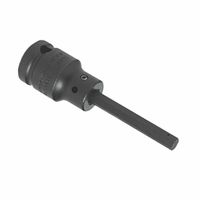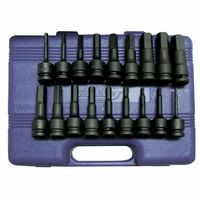Call +(254) 703 030 000 / 751 483 999 / 721 704 777
- Home
- Tools
- Sockets Bits
- Socket Bits Sets
- Impact Socket Bits Sets
.....Read More
Frequently Asked Questions
What are impact socket bits used for?
Impact socket bits are specialized tools designed for use with impact drivers and wrenches. They are used to fasten or loosen nuts, bolts, and other fasteners in high-torque applications. The primary purpose of impact socket bits is to withstand the intense force and vibrations generated by impact tools, which are more powerful than standard hand tools.
These bits are typically made from high-strength materials like chrome molybdenum or chrome vanadium steel, which provide durability and resistance to wear and tear. The design of impact socket bits includes thicker walls and a more robust construction compared to regular socket bits, allowing them to absorb the shock and prevent cracking or breaking under pressure.
Impact socket bits are commonly used in automotive repair, construction, heavy machinery maintenance, and industrial applications. They are essential for tasks that require significant torque, such as removing rusted or over-tightened fasteners, assembling large structures, or working with heavy-duty equipment.
The bits come in various sizes and shapes to accommodate different fastener types, including hex, Torx, and Phillips. They are often part of a set, providing versatility for various tasks. The use of impact socket bits enhances efficiency and safety, as they reduce the risk of tool failure and potential injury during high-torque operations.
In summary, impact socket bits are crucial for applications requiring high torque and durability, ensuring reliable performance and longevity in demanding environments.
Can I use regular sockets with an impact driver?
No, you should not use regular sockets with an impact driver. Regular sockets are designed for use with hand tools and are not built to withstand the high torque and vibrations produced by an impact driver. Using regular sockets with an impact driver can lead to several issues:
1. **Material and Design**: Regular sockets are typically made from chrome vanadium steel, which is not as durable as the chrome molybdenum steel used in impact sockets. Impact sockets are designed to absorb the shock and torque from an impact driver, whereas regular sockets can crack or shatter under such stress.
2. **Safety Concerns**: The risk of a regular socket breaking under the force of an impact driver can pose a safety hazard. Shattered pieces can become projectiles, potentially causing injury.
3. **Performance**: Regular sockets may not fit as securely on an impact driver, leading to slippage or rounding of fasteners. Impact sockets have a thicker wall and a more secure fit, reducing the risk of damaging the fastener.
4. **Tool Damage**: Using regular sockets can also damage the impact driver itself. The improper fit and material can cause excessive wear on the tool's anvil and other components.
For these reasons, it is recommended to use impact sockets specifically designed for use with impact drivers. They are built to handle the high torque and provide a safer, more efficient operation.
What is the difference between impact sockets and regular sockets?
Impact sockets are designed for use with impact wrenches and drivers, while regular sockets are intended for use with hand tools like ratchets. The key differences between them include:
1. **Material and Construction**: Impact sockets are made from softer, more ductile steel, such as chrome molybdenum, which can absorb the sudden, high-torque impacts from power tools. Regular sockets are typically made from harder, more brittle chrome vanadium steel, which is suitable for manual applications.
2. **Finish**: Impact sockets usually have a black oxide or phosphate finish to prevent corrosion and reduce glare, whereas regular sockets often have a polished chrome finish for ease of cleaning and corrosion resistance.
3. **Wall Thickness**: Impact sockets have thicker walls to withstand the stress of high-torque applications, reducing the risk of cracking or shattering. Regular sockets have thinner walls, which are adequate for hand tool use but may fail under impact conditions.
4. **Design**: Impact sockets often feature a six-point design to provide a better grip on fasteners and reduce the risk of rounding them off. Regular sockets may have a twelve-point design, which allows for easier alignment with fasteners but offers less grip under high torque.
5. **Safety**: Using regular sockets with impact tools can be dangerous, as they may shatter under the stress, posing a risk of injury. Impact sockets are specifically designed to handle the forces exerted by impact tools safely.
6. **Cost**: Impact sockets are generally more expensive due to their specialized materials and construction, but they offer greater durability and safety for power tool applications. Regular sockets are less costly and suitable for everyday manual tasks.
How do I choose the right impact socket set?
1. **Determine Your Needs**: Identify the types of projects you will be working on. Consider the size and type of fasteners you will encounter.
2. **Material Quality**: Choose sockets made from high-quality materials like chrome molybdenum or chrome vanadium for durability and strength.
3. **Drive Size**: Select the appropriate drive size (1/4", 3/8", 1/2", 3/4", or 1") based on the torque requirements and the size of your impact wrench.
4. **Socket Size Range**: Ensure the set includes a comprehensive range of socket sizes that match your needs, including both metric and SAE sizes if necessary.
5. **Deep vs. Shallow Sockets**: Decide if you need deep sockets for reaching recessed fasteners or shallow sockets for tight spaces.
6. **Point Design**: Opt for 6-point sockets for better grip and reduced risk of rounding off fasteners, especially for high-torque applications.
7. **Finish and Coating**: Look for a corrosion-resistant finish, such as black phosphate, to extend the life of the sockets.
8. **Brand Reputation**: Consider reputable brands known for quality and reliability, such as Snap-on, DeWalt, or Milwaukee.
9. **Set Completeness**: Check if the set includes additional accessories like extensions, universal joints, or adapters that might be useful.
10. **Storage Case**: A sturdy storage case can help organize and protect your sockets, making them easier to transport and store.
11. **Budget**: Balance quality with affordability. Investing in a higher-quality set can save money in the long run by reducing the need for replacements.
12. **Warranty**: Look for a set with a good warranty to ensure protection against defects and wear.
13. **User Reviews**: Read reviews and ratings to gauge the experiences of other users with the socket set.
Are impact sockets necessary for high-torque applications?
Yes, impact sockets are necessary for high-torque applications. They are specifically designed to withstand the high torque and vibrations produced by impact tools, such as impact wrenches and drivers. Unlike regular sockets, impact sockets are made from thicker, more durable materials, typically chrome molybdenum or chrome vanadium steel, which can absorb and distribute the intense forces without cracking or shattering.
The design of impact sockets includes a black oxide or phosphate finish to prevent corrosion and reduce friction, enhancing their durability under extreme conditions. Their walls are thicker than those of standard sockets, providing additional strength and reducing the risk of deformation or breakage when subjected to high torque.
Using regular sockets in high-torque applications can be dangerous. Standard sockets are usually made from chrome-plated steel, which is harder but more brittle than the materials used for impact sockets. This brittleness can lead to cracking or shattering under the stress of an impact tool, posing a safety hazard to the user and potentially damaging the tool or the fastener.
Moreover, impact sockets often feature a six-point design, which provides a better grip on fasteners and reduces the likelihood of rounding them off. This design is crucial in high-torque applications where maintaining a secure grip on the fastener is essential to prevent slippage and ensure efficient torque transfer.
In summary, for safety, durability, and performance, impact sockets are essential in high-torque applications. They are engineered to handle the demands of impact tools, ensuring both the user's safety and the longevity of the tools and fasteners involved.
What materials are impact sockets made from?
Impact sockets are typically made from materials that can withstand high torque and sudden impacts. The most common materials used are:
1. **Chrome Molybdenum Steel (Cr-Mo):** This is the most prevalent material for impact sockets. It is an alloy steel that combines chromium and molybdenum, offering excellent strength, toughness, and resistance to wear and impact. Cr-Mo steel is known for its ability to absorb shock without cracking or shattering, making it ideal for high-stress applications.
2. **Chrome Vanadium Steel (Cr-V):** While more commonly used for standard sockets, some impact sockets are also made from chrome vanadium steel. This material provides good strength and durability, though it is generally not as tough as chrome molybdenum. Cr-V sockets are often used for lighter-duty impact applications.
3. **Carbon Steel:** Some impact sockets are made from high-strength carbon steel. These are typically less expensive and may not offer the same level of durability as Cr-Mo or Cr-V sockets. They are suitable for less demanding applications where extreme impact resistance is not required.
4. **Alloy Steel:** Various other alloy steels may be used, combining different elements to achieve specific properties such as increased hardness, toughness, or resistance to wear and corrosion.
Impact sockets are often coated with a black oxide finish to prevent corrosion and reduce friction. This finish also helps in identifying them as impact-rated, distinguishing them from standard sockets. The choice of material and finish ensures that impact sockets can handle the rigorous demands of power tools like impact wrenches, providing reliability and safety in heavy-duty applications.
How do I maintain and store impact socket sets?
1. **Cleaning**: After each use, clean the sockets with a dry cloth to remove dirt, grease, and debris. For stubborn grime, use a mild detergent and water, then dry thoroughly to prevent rust.
2. **Inspection**: Regularly inspect sockets for wear, cracks, or damage. Replace any damaged sockets to ensure safety and efficiency.
3. **Lubrication**: Apply a light coat of machine oil or a rust inhibitor to prevent corrosion. Focus on the drive ends and any moving parts.
4. **Storage**: Store sockets in a dry, cool place. Use a dedicated socket organizer or tray to keep them sorted by size and type, preventing loss and damage.
5. **Environment**: Avoid storing sockets in damp or humid environments, as moisture can lead to rust and corrosion.
6. **Protection**: Use protective caps or covers for the drive ends to prevent damage during storage.
7. **Labeling**: Clearly label socket sizes and types for easy identification and quick access.
8. **Avoid Overloading**: Do not overload storage containers or drawers, as this can cause damage to the sockets and make them difficult to access.
9. **Transport**: When transporting, use a sturdy case or toolbox with padding to protect sockets from impact and jostling.
10. **Regular Maintenance**: Schedule regular maintenance checks to ensure all sockets are in good working condition and ready for use.
11. **Avoid Mixing**: Keep impact sockets separate from regular sockets to prevent confusion and ensure the right tool is used for the job.
12. **Temperature Control**: Avoid exposing sockets to extreme temperatures, which can affect their integrity and performance.

